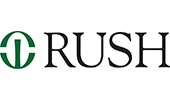
Rush’s efforts to be a leader in LGBTQ healthcare equity
Challenge
For the second consecutive year, all three Rush University System for Health hospitals have earned the LGBTQ Healthcare Equality Leader designation in the Healthcare Equality Index. This index is based on an annual survey of how health care facilities in the United States treat lesbian, gay, bisexual, transgender and queer/questioning patients and their families, as well as their own LGBTQ employees. The HEI 2020 findings are the 13th edition of the report by the educational arm of the Human Rights Campaign, the largest U.S. LGBTQ organization. The report is intended to encourage equal care of LGBTQ patients. Rush Copley Medical Center has been designated an LGBTQ leader for two consecutive years.
Actions
“Part of our mission at Rush Copley is to provide safe, quality health care – without exceptions – for the individuals and diverse communities we serve,” said John Diederich, president and CEO of Rush Copley Medical Center. “Receiving this designation again supports this mission and our efforts to make a difference in the lives and health of LGBTQ patients and all of our community."
HEI participants again were assessed and scored on four sets of criteria that represent how many policies and best practices they have implemented from each set, including nondiscrimination and staff training; LGBTQ patient services and support; LGBTQ employee benefits and policies; and LGBTQ patient and community engagement. Rush hospitals received the maximum score in each section, for a total score of 100 points, to earn the coveted status of 2020 LGBTQ Healthcare Equality Leader.
Every year, the HRC recognizes the health care facilities that participate in the HEI for their dedication and commitment to LGBTQ inclusion. The designation is particularly compelling this year because of the challenges hospitals faced from COVID-19.
“The health care facilities participating in the HRC Foundation’s Healthcare Equality Index are not only on the front lines of the COVID-19 pandemic, they are also making it clear from their participation in the HEI that they stand on the side of fairness and are committed to providing inclusive care to their LGBTQ patients,” said HRC president Alphonso David. “We commend all of the HEI participants for their commitment to providing inclusive care for all.”
Outcomes
Rush’s commitment to a welcoming environment for LGBTQ patients, students, employees and visitors includes the LGBTQ Leadership Council of Rush’s Diversity Leadership Council, which provides guidance to Rush University Medical Center, Rush University, Rush Oak Park Hospital and Rush Copley Medical Center about diversity issues and initiates events throughout the year to promote diversity.
Due in part to the council’s efforts, at the beginning of 2016, Rush became the first health system in the state of Illinois to offer comprehensive transgender health benefits to employees and students alike. In addition, Rush has implemented the following LGBTQ initiatives:
- Launch of Affirm: The Rush Center for Gender, Sexuality and Reproductive Health
- Development of a comprehensive LGBTQ policy statement detailing Rush’s commitment to the LGBTQ community
- A dedicated LGBTQ section on Rush University Medical Center’s website
- Incorporating entries for sexual orientation and gender identity into the electronic medical records system used at the Rush University Medical Center, Rush Copley Medical Center and Rush Oak Park Hospital, and providing training in the entry and use of this patient information
- Development of an institutional LGBTQ logo, which is displayed on more than 2,000 lapel pins distributed to individuals across the Rush System and a banner carried by Rush participants in Chicago and Aurora’s annual LGBT Pride Parades.
- Changing the signage on all public single-occupancy bathrooms on campus to indicate that they are "all-gender" — that is, their use is not designated specifically for either men or women. The signage is intended to be welcoming to people who are transgender or identify as being of non-binary gender (neither specifically/solely male or female).